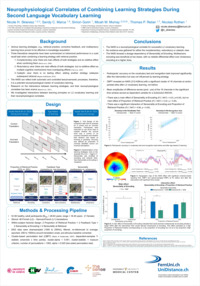Neurophysiological Correlates of Combining Learning Strategies During Second Language Vocabulary Learning: Meeting of the NeuroLeman Network and Doctoral Schools NLN 2022 - Les Diablerets (Switzerland)
UniDistance Suisse
- Skieresz, Nicole H. ORCID Faculty of Psychology, UniDistance Suisse, Brig, Switzerland; The LINE (Laboratory for Investigative Neurophysiology), Department of Diagnostic and Interventional Radiology, Lausanne University Hospital and University of Lausanne, Lausanne, Switzerland; The Sense Innovation and Research Center, Lausanne and Sion, Switzerland
- Marca, Sandy C. (Contributor) ORCID Faculty of Psychology, UniDistance Suisse, Brig, Switzerland; Faculty of Psychology, University of Geneva, Geneva, Switzerland
- Gorin, Simon (Contributor) ORCID Faculty of Psychology, UniDistance Suisse, Brig, Switzerland
- Murray, Micah M. (Contributor) ORCID The LINE (Laboratory for Investigative Neurophysiology), Department of Diagnostic and Interventional Radiology, Lausanne University Hospital and University of Lausanne, Lausanne, Switzerland; The Sense Innovation and Research Center, Lausanne and Sion, Switzerland; CIBM Center for Biomedical Imaging, Lausanne, Switzerland; Department of Hearing and Speech Sciences, Vanderbilt University, Nashville, TN, USA;
- Reber, Thomas P. (Contributor) ORCID Faculty of Psychology, UniDistance Suisse, Brig, Switzerland; Department of Epileptology, University of Bonn Medical Center, Bonn 53127, Germany;
- Rothen, Nicolas (Contributor) ORCID Faculty of Psychology, UniDistance Suisse, Brig, Switzerland;
- 2022
Published in:
- Meeting of the NeuroLeman Netword and Doctoral Schools NLN 2022 Abstract Book. - 2022
English
Research on memory has identified various learning strategies that support knowledge acquisition. Some of the most effective strategies are retrieval practice (i.e., actively recalling information), multimodal learning (i.e., presenting information via multiple sensory modalities), and corrective feedback (i.e., receiving the correct response when making an error). While each strategy has been examined separately, interactions between them and their underlying neurophysiological correlates remain to be investigated. Our study aims to investigate potential interactions between the learning strategies on associative memory (vocabulary acquisition) and their neurophysiological correlates, focusing on the N400 event-related potential – a marker for semantic violations.
Adults learned Finnish (L2) vocabulary using a mobile application where the proportion of retrieval, multimodality, and feedback on individual translations were varied. Before and after 14 days of learning, vocabulary knowledge was assessed in a vocabulary test and a recognition task, where correct and incorrect translations had to be identified while EEG was recorded. We assessed the correctness of responses and compared the N400 for correct and incorrect translations by learning strategy. We hypothesized that incorrect vs. correct translations elicit an N400 after learning to index vocabulary acquisition. We expected this effect to be modulated by combinations of different learning strategies. Preliminary results show that vocabulary learning was successful and indicate a modulation in the N400 window. Learning strategies did not modulate the participants performance. These results suggest that the N400 can be used as marker for L2 vocabulary learning.
Adults learned Finnish (L2) vocabulary using a mobile application where the proportion of retrieval, multimodality, and feedback on individual translations were varied. Before and after 14 days of learning, vocabulary knowledge was assessed in a vocabulary test and a recognition task, where correct and incorrect translations had to be identified while EEG was recorded. We assessed the correctness of responses and compared the N400 for correct and incorrect translations by learning strategy. We hypothesized that incorrect vs. correct translations elicit an N400 after learning to index vocabulary acquisition. We expected this effect to be modulated by combinations of different learning strategies. Preliminary results show that vocabulary learning was successful and indicate a modulation in the N400 window. Learning strategies did not modulate the participants performance. These results suggest that the N400 can be used as marker for L2 vocabulary learning.
- Language
-
- English
- Classification
- Memory and learning
- License
- License undefined
- Identifiers
-
- ARK ark:/51647/srd1323773
- Persistent URL
- https://n2t.net/ark:/51647/srd1323773
Statistics
Document views: 24
File downloads:
- LNDS_poster_NS_30082022.pdf: 95
